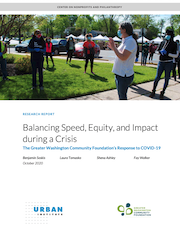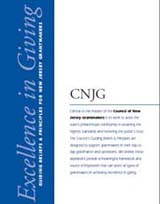Site Search
- resource provided by the Forum Network Knowledgebase.
Search Tip: Search with " " to find exact matches.

The COVID-19 public health and economic crisis has changed our world as we know it. As employers moved to remote work, schools shifted to distance learning, and businesses closed completely, it became clear that the impact on residents, nonprofits, and businesses was far greater than anyone could have ever imagined.
In response to the growing and evolving needs of our region, the Greater Washington Community Foundation established the COVID-19 Emergency Response Fund to raise and rapidly deploy funding to local nonprofits providing food, shelter, educational supports, and other critical services.
From the beginning our goal was clear: to address the immediate needs and reach adversely affected communities, particularly low-income households and communities of color. We know all too well that in a crisis like this, these marginalized communities are hit the hardest, and often take the longest to recover.
In times of crises, The Community Foundation is our region’s philanthropic first responder, bringing together individuals and families, philanthropic peers, corporate partners, and local government advisors to address community issues. Building on our rich history of emergency response work, we grounded our COVID-19 response efforts in a similar coordinated approach.
This report chronicles the steps taken, under immense pressure, to develop a coordinated emergency response effort to support a broad range of needs across the region. Once again this effort has demonstrated that working in partnership and close collaboration with our philanthropic peers and local government advisors is an effective way to manage a response to both urgent and longer-term needs.

This includes insights and tips related to board governance, legal compliance, grantee communications, fiscal responsibility, public disclosure, and many other key areas of foundation governance and operations. It is intended to serve as a practical resource to assist foundations in their grantmaking.
As we know, COVID-19 had a significant impact on student academic achievement. School districts across the state and country are working to accelerate student learning with a particular focus on literacy. Join us for our next Newark Education Funder meeting as we explore how funders can support a community approach to literacy, including the recently released Ten Point Literacy Plan. We will hone in on statewide and local data with the support of a recent study published by JerseyCAN, and then discuss how we can collaborate with grantees on systems that complement the traditional K-12 school day, particularly early literacy and support for reading at home, after-school and community programs, and collaborations with institutions like the Newark Public Library.
Panelists:
Paula White, Executive Director, JerseyCAN
Christian Zabriskie, Director, Newark Public Library
Nayibe Capellan, CEO, Programs for Parents
Catherine Wilson, President and CEO, United Way of Greater Newark
Cost: Free for CNJG Members; $50 for Non Member Grantmakers.
As a follow-up to our Giving in Indiana study (released earlier this year), Indiana Philanthropy Alliance is pleased to share this snapshot of promising practices for advancing diversity, equity and inclusion in Indiana philanthropy. Throughout our state, foundations are incorporating the values of diversity, equity and inclusion (DEI) into their organizational cultures; engaging diverse populations as staff, board members, donors, and grantees; and working to make their communities more welcoming places. This report is an effort to capture a sampling of these endeavors.
A working glossary of terms to help shape a common language for work in Community Capacity. This glossary is intended to help promote philanthropy's roles in building community capacity by defining core concepts and closely related terms.
Two different CNJG members queried the CEO listserve on how/when/how to return to the office following the COVID-19 pandemic. CNJG staff compiled the answers from the responding members removing identifying information of the respondents.
An overview on the self-dealing law, including definitions, common problem areas, exceptions, penalties, and resources.
Grantmaking at the Crossroads is a workbook designed to provide foundations with a new grantmaking methodology that works at the intersection of place, population, and issue. It offers a pathway to greater inclusion of communities that are often excluded or marginalized by foundation funding and enables foundations to maintain their focus and priorities while expanding their reach and effectiveness.
The Grand Rapids Community Foundation and the Kalamazoo Community Foundation volunteered to be laboratories for Grantmaking at the Crossroads and have been critical informants for this workbook. Each of these foundations holds an unwavering commitment to ongoing learning; this publication would not have happened without their support and engagement and the financial support of the Arcus Foundation.
Philanthropic organizations of all shapes and sizes are well positioned to support Communities for a Lifetime (CfaL). This issue brief explores four roles for philanthropy in advancing CfaL work.
In this briefing, Bob Kim, Executive Director, Education Law Center, will address need for systemic litigation and legal services, research, and data collection. He will also contextualize the current environment by discussing broader trends affecting education, such as privatization, lack of trust in government, and culture wars. Robert Morrison, CEO, Quadrant Research, will address the federal government's limited role in public education, with ultimate authority residing at the local district level and the need for funders to understand these trends and their implications for New Jersey's education system. Moderated by Brandon McCoy, President and CEO, Fund for New Jersey, this discussion will address the biggest challenges faced, lessons from historical efforts, and gaps in education policy and advocacy.
Robert Kim, Esq. is the Executive Director of Education Law Center, a legal advocacy organization dedicated to advancing and protecting public education and the rights of public school students nationwide. In 2020, he served as a member of the Biden-Harris Presidential Transition Team. From 2011 through 2016, he served in the Obama Administration as deputy assistant secretary in the U.S. Department of Education Office for Civil Rights, which enforces federal civil rights laws in K-12 and postsecondary institutions nationwide. Earlier in his career, Kim served as a senior policy analyst at the National Education Association and as a staff attorney at the American Civil Liberties Union of Northern California. His most recent publications include Education and the Law, 6th ed. (West Academic Publishing, 2024) and Elevating Equity and Justice: Ten U.S. Supreme Court Cases Every Teacher Should Know (Heinemann, 2020).
Robert B. Morrison, CEO of Quadrant Researc, is a nationally renowned leader in arts and music education, recognized for his pioneering research, influential advocacy, and transformative policy initiatives. As founder and CEO of Quadrant Research—the nation’s leading arts education data analytics and market research firm—Morrison has driven groundbreaking advancements in expanding access to music and arts programs across the United States. Morrison played a pivotal role in establishing New Jersey as a national model. He founded and directed Arts Ed NJ, New Jersey’s statewide arts education policy group, and spearheaded initiatives that led to the state being the first in the country to include arts education in annual school reporting. In Arkansas, his collaboration with the governor helped mandate music and arts programs for all public school students, a policy later adopted by Louisiana.
Brandon McKoy, President and CEO of Fund for New Jersey, is an established leader in public policy analysis and advocacy statewide and nationally. Prior to his current position, he worked as the Vice President for State Partnerships and Co-Leader of the State Fiscal Policy Division at the Center on Budget and Policy Priorities in Washington, D.C. At New Jersey Policy Perspective, McCoy held several roles over the course of seven years, first as a State Policy Fellow through the Center on Budget and Policy Priorities’ program, next as a Policy Analyst, and then as Director of Government and Public Affairs, before assuming leadership of the organization as NJPP’s President from 2019 through late 2021. Throughout those years, he researched and promoted a variety of issues including the minimum wage, paid sick leave, equitable taxation, public budget processes, the legalization and regulation of cannabis, and much more.
Cost: Free for CNJG Members; $75 for Non Member Grantmakers
This program is only open to staff and trustees from grantmaking organizations.
Programs in this Series:
March 13: Making Sense of Federal Policy: Understanding What it Means for NJ: Immigration
March 20: Making Sense of Federal Policy: Understanding What it Means for NJ: Health
March 27: Making Sense of Federal Policy: Understanding What it Means for NJ: Environment
April 3: Making Sense of Federal Policy: Understanding What it Means for NJ: Education
April 10: Making Sense of Federal Policy: Understanding What it Means for NJ: Housing
April 17: Making Sense of Federal Policy: Understanding What it Means for NJ: Media & Journalism
April 24: Making Sense of Federal Policy: Understanding What it Means for NJ: Arts
Webinar Video
Education Law Center: Trump 2.0 Federal Revenue Tool - Track how federal funding (Title I, IDEA, etc.) cuts would affect NJ
United States Department of Education Letter: Consider how the current federal guidance against DEI may represent an incursion into state responsibility and autonomy over school operations and curriculum
The Ford Institute for Community Building, a program of The Ford Family Foundation, works to help community leaders learn how to implement local solutions based on principles of effective community building. This paper describes the development and work of the The Ford Institute for Community Building.
The Council of New Jersey Grantmakers’ offers listserve services as a benefit of CNJG membership.
CNJG’s listserves facilitate ongoing group e-mail discussions among subscribed members. Members can share information and expertise, ask questions, and gather opinions of colleagues across the network. Listserves also enable members to get the most up-to-date information on related programs being offered throughout the field.
CNJG initially assigns new members to relevant listserves based on your submitted member profile. Contact Craig Weinrich to join any other listserve that interests you. You can unsubscribe from a listserve at any time by using the link found at the bottom of each email sent via the listserve.
In May 2024, our listserve provider updated its email engine, and now the automatic de-duping feature is no longer available, so sending an email to more than one listserve results in multiple emails to the recipient.
If you send an email to a listserve, and it bounces back to you, you are not on that listserve. Please contact Craig to add you to that listserve.
The listserves available are:
Camden Funders - [email protected]
Bergen Funders - [email protected]
Community Foundation CEO’s - [email protected]
CNJG Member CEO's - [email protected]
CNJG Member CFO’s and Finance Managers - [email protected]
CNJG Member Communications Staff - [email protected]
Corporate Funders - [email protected]
COVID-19 Funders - [email protected]
Culture Funders - [email protected]
Disaster Response Funders - [email protected]
Education Funders - [email protected]
Emerging Leaders in Philanthropy - [email protected]
Environmental Funders - [email protected]
Family Funders - [email protected]
Food Funders - [email protected]
Health Funders - [email protected]
Monmouth & Ocean Roundtable of Funders - [email protected]
Newark Funders - [email protected]
New Jersey Census Funders - [email protected]
Paterson Funders - [email protected]
Racial Equity Funders - [email protected]
STEAM Funders - [email protected]
South Jersey Funders - [email protected]
Strong & Thriving Communities - [email protected]
Trenton Area Funders - [email protected]
There are some restrictions for joining listserves:
· only CEOs (or equivalent) can join the CEO listserve;
· only CEOs (or equivalent) of a Community Foundation can join the Community Foundation CEO listserve;
· only CFOs (or equivalent) can join the Financial listserve
· only family foundation staff and trustees can join the Family Funders listserve;
· only corporate giving professionals can join the corporate listserve
Please refer to the Listserves’ Membership Policies below for information on using the listserves.
